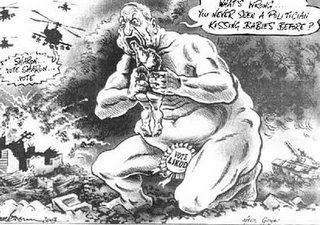My informal, partial and unscientific survey of the left blogosphere shows us divided about 50/50 on the cartoon issue. It's almost entirely a matter of emphasis. One side says "yeah, we shouldn't give offense, but the real issue is protecting free speech"; the other side replies "yeah, we should protect free speech, but the real issue is..." (I am cutting the second example short, because it's always easier to caricature one's own side, and I am hesitant to put the latter summary in such a way that will cause people to say 'no, it's not that, it's this!' There have been a number of versions of the latter. I've read them, trying to keep an open mind. But in the end I don't feel very persuaded. Not that I disagree that the Muslim world has legitimate grievances, that some sentiments are genuinely offensive and people should use free speech responsibly, or that there are issues of class, race and power in Europe that make the situation parallel to racism in the U.S. It's just that against sentiments like these --

-- I think those issues pale. For many in the west, free speech is a fundamental value, and we are -- and should -- stand up for it. (Nor do I take the two values to be equivalent: this is not moral relativism here: one strikes me as rationally defensible in a way the other is not. Further, one imposes itself on other people's values and lives in a way the other does not.)
People are
openly calling for murder on the streets of London. Not just one sign: many. Not to mention the burning of embassies (three last I saw -- the Danish embassies in Lebanon and Syria, the Norwegian embassy in Syria).
Now I hope that people who say that those voices represent a small fraction of the Muslim world are right -- dear God I hope they're right, because the only hope we have of spreading the values of tolerance and open debate and the acceptance of multiple points of view up to and including blasphemy is in Muslims themselves spreading those ideas. We can't impose them. I take it this is
P. Z. Myers's point (although this isn't how he put it.)
But the fight to spread liberal (in the broadest sense of the word) values is only half of the issue. The other issue is defending liberal values where they now exist. I've seen one or two people say things such as "free speech only protects against the government". But this seems to me wildly wrong. The government, perhaps, can only protect against violations by itself. But civil society, and an open and vigorous defense of its values, can protect against other, equally insidious violations. Put simply, the threat of mob violence, or the threat of assassination, can suppress speech as effectively as a government. But we can't let it. The reason that people find P. Z. Myers's response insufficient, I think, is that it ignores this half of the issue: people are trying to suppress speech in liberal societies through threat of violence. Responding to that is a separate, but equally important, thing than liberalizing currently closed societies.
Another thoughtful liberal blogger,
Juan Cole, wrote this:
Had the Danish newspaper published antisemitic cartoons that showed, e.g., Moses as an exploitative money lender and brought into question the Holocaust, there would also have been a firestorm of protest. For the secular world, the injuries and unspoken hierarchies of race are what cannot be attacked. Muslims are not, as you will be told, the only community that is touchy about attacks on its holy figures or even just ordinary heros....
Human beings are all alike. Where they are distinctive, it comes out of a special set of historical circumstances. The Muslims are protesting this incident vigorously, and consider the caricatures insupportable. We would protest other things, and consider them insupportable.
I agree that all communities protest some speech. And that the fight for civil society is one that is ongoing and universal. But that Muslims are protesting this incident "vigorously" is not what's bothering people -- at least not what's bothering me. It's that (some) Muslims are protesting this incident
violently, and with the threat of violence. I hope that that would not happen in parallel situations; and if it did, I would certainly condemn it equally strongly.
I also think that Juan Cole's parallel about the Moses cartoon is actually demonstrably wrong. Here is a cartoon that plays on a longstanding and viciously antisemitic claim, that Jews eat Christian babies; it apparently appeared in a U.K. newspaper, the Independent (
via):
Were there protests? I don't know: I didn't hear about any. But I'm fairly certain that I would have heard about death threats or torching embassies. There wasn't any. And there shouldn't have been any -- even though I agree that that vile cartoon ought not to have been published. Ought not to, because the cartoonist and his/her editor should have known better: but if they don't know better, all we should do -- all we can do -- is protest, and perhaps boycott the paper.
Which is simply a far cry from this:
Yes, as at least one person has pointed out, it looks like all those signs were made by one person or group. And as I said before: I hope so. I hope this is a fringe reaction. I know that there are Muslims who are openly opposing this violence -- and thank God for them. But scenes such as that are still horrifying.
Bigotry against Muslims is a real problem in the west, and we should fight it. Indeed, we must fight it if we are to spread liberal values throughout the world, as I would hope we all want to. (This is true in a double sense: we must fight it, morally, because doing so is mandated by those liberal values; and we must fight it, pragmatically, in order to succeed in spreading those liberal values.) But at the same time those same liberal values mandate that we must utterly reject the notion that people can reach into existing liberal societies and censor people by threatening to murder them. Dear Lord, even to say this makes it sound utterly obvious! But it isn't an idle threat, as the murders of Salman Rushdie's Japanese translator and Theo Van Gogh demonstrate. So it's one we have to confront.
I want to go a bit farther, though, and actively defend
my values, which say that presenting a slander or stereotype against a particular group of people is a worse thing than blasphemy -- of any type, against anything. The above antisemitic cartoon falls into the former category, repeating a notion that has led to the oppression and murder of Jews for centuries. Now,
some of the cartoons recently published in Europe seem to fall into the former category as well, since they imply that all Muslims are suicide bombers, a notion that could easily lead to the oppression of Muslims if it hasn't already. This cartoon, for example, seems to fall into that category:
But others of the recently published cartoons pretty clearly
don't fall into the former category; they are simply about the prohibition of depicting Mohammed at all -- an issue of blasphemy that does not negatively depict any group of people in any fashion. This cartoon, for example, is rather directly about that:
The whole point of that cartoon is the fear that people have of trespassing on other's religious sensibilities.
And there
my values are that we should feel free to do it. Unlike some conservatives who've written about this, I support blasphemy against all religions. I think it's an important part of an open, genuine debate on important things -- and an important counter to the powerful respect that our culture has for religious values as such. Many might disagree, and (peacefully) protest what I say: fine. That's their right. (Maybe they'll even convince me, who knows.) But that's also where there rights end.
Note that there are two issues here. The one is simply the profound immorality of threatening violence as a response to
any speech, whatever its nature. This is something which I would hope all societies everywhere could agree on. The second issue is whether blasphemy is an acceptable thing, or if it should be treated the way racist/antisemitic speech is in the west, i.e. reacted to with outrage and (peaceful) protests.
Whatever one thinks of the second issue, it is in fact tangential to the first, given what's going on. But the second issue matters, too. This is not something which everyone agrees on; many societies will treat blasphemers as we do racists -- hell, many of those on the right defending free speech in this instance are saying that, while free speech is important, people ought to refrain from blasphemy. And while I do think the first issue, the threat of violence, is what's most important, I think the second one is important too: and here I would want to argue that blasphemy is not like racism/antisemitism, and should not be treated as such. Juan Cole may simply be making the comparison to get across the emotional response of the Muslim world, in which case I'd agree. But if he's saying that we should treat blasphemers the way we do racists, then I very much don't.
The Vatican has issued a statement on the matter,
saying: "The right to freedom of thought and expression . . . cannot entail the right to offend the religious sentiment of believers". This is ambiguous as to which of the two issues they are addressing. But either way it's flat wrong. The right to freedom of thought and expression
must entail the right to offend the religious sentiment of believers, or it isn't a right to freedom of thought and expression at all. And even if you disagree with my contention that it isn't such a horrible thing for people to blaspheme -- even if you think we should shun and disparage blasphemers the way we do racists and antisemites -- I would hope you would agree that we still must support the right to offend religious sentiments -- without fear of government persecution, of course, but also without fear of violent death. That right, at least, must be protected.
Having linked to a few bloggers with whom I disagree, let me end by endorsing the remarks of one with whom I agree. I give you
Josh Marshall:
An open society, a secular society can't exist if mob violence is the cost of giving offense. And that does seem like what's on offer here. That's the crux of this issue -- that the response is threatened violence and more practical demands that such outrages must end. It's back to the fatwa against Salman Rushdie and the Satanic Verses (which, if you're only familiar with it as a 'controversy' is a marvelously good book) -- if on a less literary and more amorphous level. The price of blasphemy is death. And among many in the Muslim world it is not sufficient that those rules apply in their countries. They should apply everywhere. Perhaps something so drastic isn't called for -- at least in the calmer moments or settled counsels. But at least European governments are supposed to clamp down on their presses to heal the breach.... So liberal mores versus theocratic mores. Where's the possible compromise? There isn't any. On the face of it this gets portrayed as an issue of press freedom. But this is much more fundamental. 'Press freedom' is just one cog in the machinery of a society that doesn't believe in or accept the idea of 'blasphemy'. Now, an important cog? Yes. But I think we're fooling ourselves to reduce this to something so juridical and rights based. I don't want to imply this is only a Muslims versus modernity issue. I know not all Muslims embrace these views. More to the point, it's not only Muslims who do. You see it among the haredim in Israel. And I see it with an increasing frequency here in the US. Is it just me or does it seem that more and more often there are public controversies in which 'blasphemy' is considered some sort of legitimate cause of action -- as if 'blasphemy' can actually have any civic meaning in a society like ours. Anyway, you get the idea. Much, probably most of what gets talked about as the 'war on terror' in politics today is a crock -- a stalking horse for political power grabs, a masquerade of rage and revanchism, a running excuse for why we've made so many stupid decisions over the last five years. In some cases, on a more refined plain, it's rooted in intellectual or existential boredom. But beyond all the mumbojumbo about how we're helping ourselves by permanently occupying Iraq and running the country's finances into the ground, there is a conflict. There is a basic rupture in the world. It's not the US or the West versus Islam. At least it's not that simple. In any case, the government in this country is too close to illiberalism, militarism and theocracy for that to work as a model. But it is there -- liberalism and authoritarianism, modernity and theocracy.
Amen, Dr. Marshall! And in the end, those of use who support liberalism versus authoritarianism, modernity versus theocracy on issues here in the U.S. must do so on this issue too.
In our time, one of the great enemies of freedom is theocracy: the imposition of belief on non-believers. And we must fight it wherever we see it. All the more so if we see it burning buildings and threatening murder.
(
Update: On the "it's a strange world" side of the equation,
several people have asked forms of this question: where in the world are the protestors getting all those Danish flags to burn? It is a bit of a puzzle: I wouldn't know offhand where to get a Danish flag here in Ithaca, New York if I wanted one, and would probably have to go on the net and wait for it to arrive. So where are they all coming from?)














